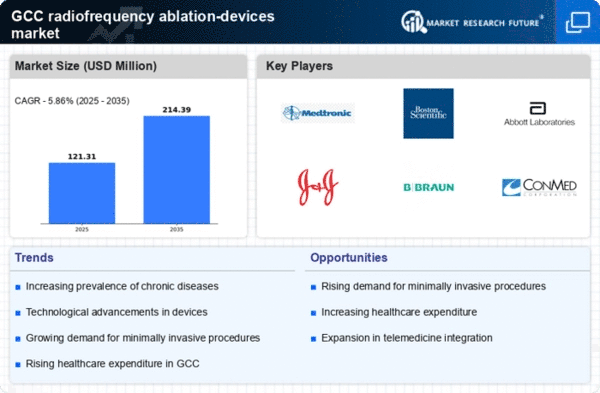Due to a number of important market factors, including the rising incidence of chronic illnesses, especially cardiovascular and oncological ailments, throughout the area, the GCC radiofrequency ablation devices market is expanding significantly. The need for these devices is fuelled by the growing popularity of minimally invasive operations as well as developments in medical technology. There are clear attempts to improve healthcare infrastructure as the governments of the GCC countries concentrate on raising the standard and accessibility of healthcare.
The UAE Health Strategy 2021 and Saudi Vision 2030 are two initiatives that highlight the need for cutting-edge and successful medical treatments while promoting contemporary healthcare solutions, such as RF ablation technologies. Cooperation between foreign medical equipment producers with regional healthcare facilities is one of the opportunities to be investigated in the GCC market. This could result in customized solutions that deal with the region's unique healthcare issues.
Additionally, there is room for expansion in clinical education and training programs, which would guarantee that medical personnel are properly prepared to use radiofrequency ablation equipment. Recent patterns indicate a move towards the creation of cutting-edge RF ablation technologies with an emphasis on enhancing patient outcomes and shortening recovery periods. The region's increasing focus on digital transformation in healthcare is in line with the integration of telemedicine and digital health solutions, which is promoting remote patient monitoring and follow-up care.
Additionally, patients are becoming more aware of their treatment options, which is raising demand for both conventional and cutting-edge techniques like radiofrequency ablation. This is in line with the GCC's mission to improve health literacy and patient education throughout the region, ensuring that people are aware of the options available to them for treatment.
GCC Radiofrequency Ablation Devices Market Driver
Increasing Prevalence of Chronic Diseases
The increasing prevalence of chronic diseases such as cancer, cardiovascular disorders, and pain management conditions is a significant driver for the GCC Radiofrequency Ablation Devices Market Industry. According to the World Health Organization, chronic diseases account for around 73% of total deaths in the GCC region, highlighting the urgent need for advanced medical treatments. Countries like the UAE and Saudi Arabia have reported a sharp rise in cancer cases, with a reported increase of approximately 20% in the last ten years.
The growth of healthcare infrastructure, supported by governments' health initiatives, enables the adoption of advanced radiofrequency ablation devices to treat such widespread ailments effectively. Major healthcare providers, including Saudi German Hospitals and NMC Health, are actively integrating these devices into their treatment protocols, enhancing the overall market potential.
Technological Advancements in Radiofrequency Ablation
Recent technological advancements in radiofrequency ablation techniques contribute significantly to the GCC Radiofrequency Ablation Devices Market Industry growth. The development of minimally invasive procedures has increased the adoption of these devices, as they offer benefits such as reduced recovery time and lower risk of complications.
The Saudi Food and Drug Authority has recently approved several new radiofrequency ablation technologies that facilitate more precise targeting of affected tissues.This not only makes procedures safer but also leads to better patient outcomes, influencing physicians and hospitals to adopt these cutting-edge devices. Companies like Medtronic and Boston Scientific are at the forefront of innovation, ensuring continued market growth in GCC.
Rising Patient Awareness and Demand for Minimally Invasive Procedures
Rising patient awareness regarding minimally invasive treatment options is fueling the growth of the GCC Radiofrequency Ablation Devices Market Industry. Initiatives by healthcare organizations in the GCC to educate patients about the benefits of such procedures have resulted in increased demand. For instance, various campaigns led by the Ministry of Health in the UAE highlight the effectiveness of radiofrequency ablation for treating various cancers and pain management.
Reports suggest that this awareness has contributed to a 15% increase in patient inquiries about minimally invasive procedures over the past five years. As patients increasingly prefer these options, healthcare facilities in the region are investing in acquiring the latest radiofrequency ablation devices, further driving market growth.



















